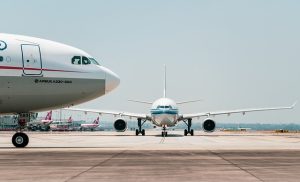
Airplanes use different methods for boarding as well as deplaning. Two primary of the most common methods are jetways and airstairs. They both allow passengers to enter and exit airplanes, but they have distinct advantages and drawbacks that affect their utility.
Jetways
Jetways offer a convenient boarding solution. Also known as an airgate or jet bridge, a jetway is a tunnel-like bridge that connects an airport terminal to an airplane. If you’ve ever flown in or out of a major airport, you’ve probably seen them. Jetways are commonly found at most major airports.
Benefits of jetways include the following:
- Protects passengers and crew from weather: Jetways are completely enclosed so that passengers and crew can board the airplane without being exposed to bad weather.
- Improved accessibility: Jetways offer improved accessibility by allowing passengers who are disabled or mobility impaired to board the airplane without climbing stairs.
- Improved boarding efficiency: Another benefit of jetways is improved boarding efficiency. Large airplanes, such as wide-body jets, often feature two or more jetways. As a result, passengers can quickly board or deplane them.
Airstairs
Not all airplanes use jetways for boarding. While jetways are commonly used by large commercial jets, smaller airplanes often use stairs for boarding. Known as airstairs, they allow passengers to enter or exit the airplane via a set of stairs.
Some airstairs are built into the airplane itself. They are typically affixed to clamshell-style doors. As the doors open, the airstairs will lower. There are also mobile airstairs. As the name suggests, mobile airstairs aren’t built into the airplane. Instead, they are separate, mobile stairs. Most mobile airstairs are wheeled. When boarding or deplaning, they are moved to the airplane’s doors.
Benefits of airstairs include the following:
- Low cost: When compared to jetways, airstairs are more cost-effective. They cost less to produce and maintain, making them a popular choice.
- Ideal for small airplanes: While most large airplanes use jetways, airstairs are the go-to method for boarding and deplaning small airplanes. They are fast, inexpensive, and they don’t require complex equipment.
- Versatility: Another benefit of airstairs is versatility. Not all airports can accommodate jetways. Small airports, for example, lack the infrastructure needed for jetways. Even if an airport is too small for jetways, though, it will likely support airstairs. Airstairs can be used in small airports and even remote landing strips.



